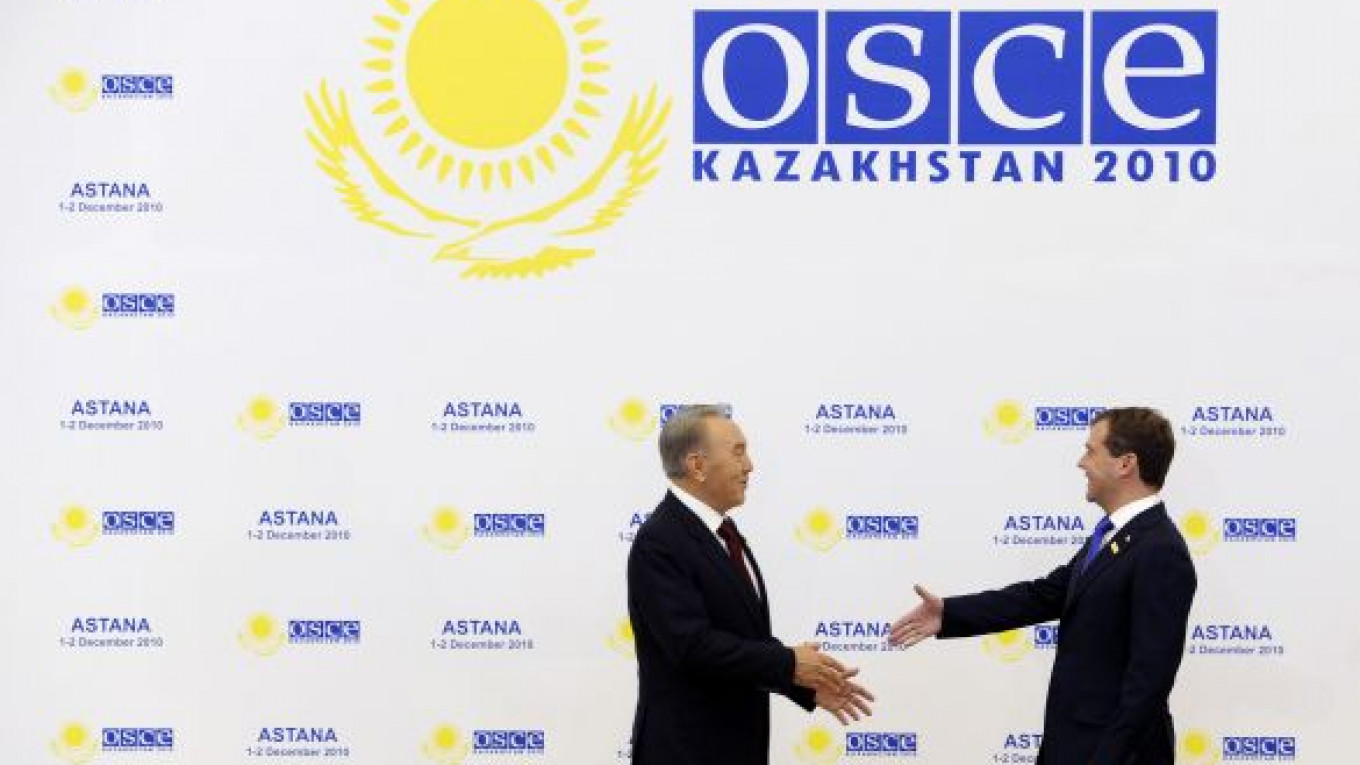ASTANA, Kazakhstan — The United States on Wednesday called on Europe's main security watchdog to lend more support to the war in Afghanistan and resolve "frozen conflicts" across the former Soviet Union.
Secretary of State Hillary Clinton, leading the U.S. delegation to the first summit in 11 years of the Organization for Security and Cooperation in Europe, said the 56-member group must become more decisive to stay relevant.
"Regional crises and transnational dangers threaten our people. Democracies are under pressure, and protracted conflicts remain dangerously unresolved," Clinton said in an address to the summit, held in the Kazakh capital Astana.
Kazakhstan this year became the first ex-Soviet country to chair the OSCE, and the summit, the first since 1999, is a matter of immense personal pride for President Nursultan Nazarbayev, who has run the Central Asian state for more than 20 years.
Amid tight security in Kazakhstan's showpiece capital, Nazarbayev also urged 38 visiting heads of state and other senior officials to revive the role of the OSCE in tackling international terrorism, drug trafficking and economic crises.
Frozen post-Soviet conflicts, including the Nagorno-Karabakh dispute between Armenia and Azerbaijan, Moldova's rebel region of Transdnestr and Georgia's separatist regions of South Ossetia and Abkhazia, are high on the OSCE summit agenda.
"This organization has really started losing its potential. We should put it straight," President Dmitry Medvedev said. "We need a clearer legal framework and universal rules for using the resources of this organization."
Clinton arrived at the summit despite U.S. doubts about the effectiveness of the OSCE, a sometimes uneasy mix of Western democracies and emerging economies of the former Soviet Union that often runs afoul of internal disagreements over issues such as human rights.
Official enthusiasm for the summit in Kazakhstan has been soured by criticism by rights groups and the West of its poor track record on democracy during its chairmanship of the OSCE.
"We have created a democracy in a part of the world where it never existed before," Nazarbayev said in his opening speech. "Stability in Kazakhstan, first and foremost, means economic growth. We developed the economy first in order that poverty did not humiliate our young democracy."
European Council President Herman Van Rompuy said: "There is no security without freedom."
The OSCE's chairperson-in-office, Kazakh Foreign Minister Kanat Saudabayev, said the summit would address "urgent security challenges" including conflict in Kyrgyzstan and Afghanistan.
"The United Nations would welcome greater OSCE involvement in supporting Afghan national programs and priorities," said UN Secretary-General Ban Ki-moon.
Kazakhstan, Central Asia's largest economy, has watched with unease as radical Islam and drug trafficking have become more prevalent in the sparsely populated region.
Tajik troops are fighting Islamist insurgents, while Kyrgyzstan suffered its worst bloodshed in post-Soviet history when more than 400 people were killed in ethnic clashes in June, only two months after its president was overthrown.
"The acute political situation in Kyrgyzstan could become the catalyst for new conflicts in Central Asia," Nazarbayev said.
The EU's Van Rompuy said recent experiences in some Central Asian countries had shown the need for the OSCE "to move from early warning to early reaction and improve decision making."
A Message from The Moscow Times:
Dear readers,
We are facing unprecedented challenges. Russia's Prosecutor General's Office has designated The Moscow Times as an "undesirable" organization, criminalizing our work and putting our staff at risk of prosecution. This follows our earlier unjust labeling as a "foreign agent."
These actions are direct attempts to silence independent journalism in Russia. The authorities claim our work "discredits the decisions of the Russian leadership." We see things differently: we strive to provide accurate, unbiased reporting on Russia.
We, the journalists of The Moscow Times, refuse to be silenced. But to continue our work, we need your help.
Your support, no matter how small, makes a world of difference. If you can, please support us monthly starting from just $2. It's quick to set up, and every contribution makes a significant impact.
By supporting The Moscow Times, you're defending open, independent journalism in the face of repression. Thank you for standing with us.
Remind me later.






